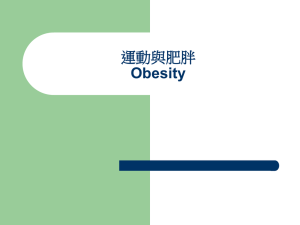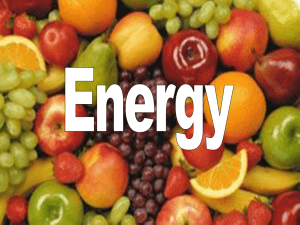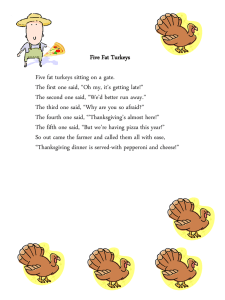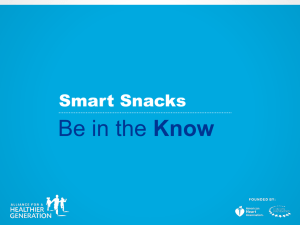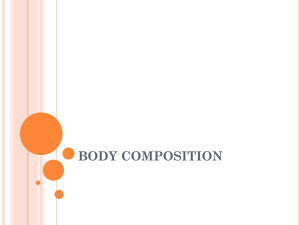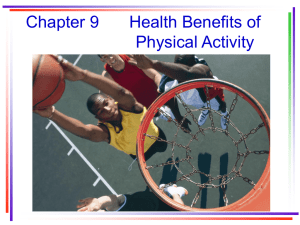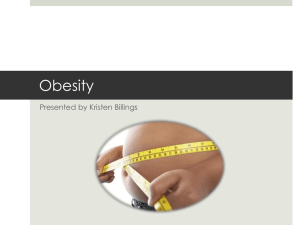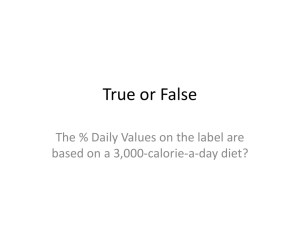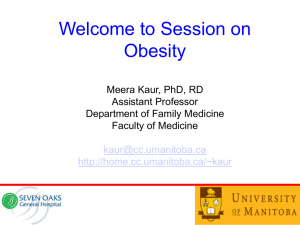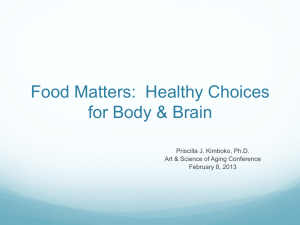KN-Food-and-Mood - Centerstone Research Institute
advertisement
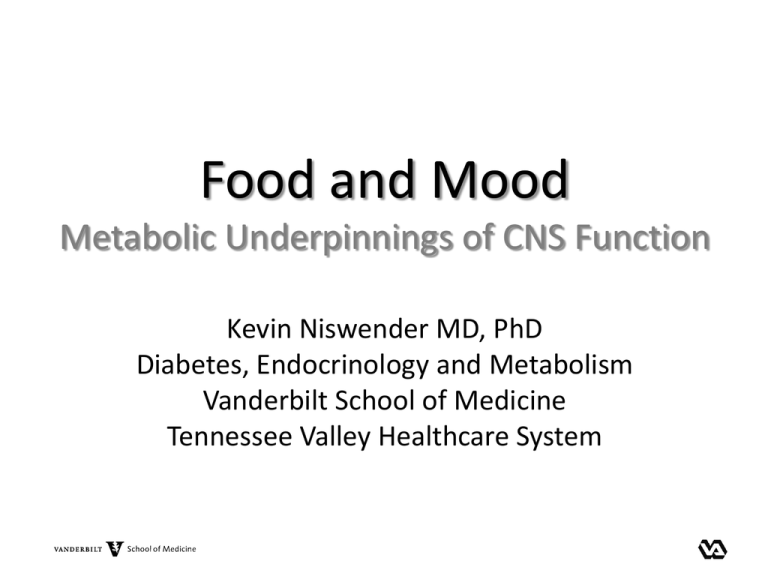
Food and Mood Metabolic Underpinnings of CNS Function Kevin Niswender MD, PhD Diabetes, Endocrinology and Metabolism Vanderbilt School of Medicine Tennessee Valley Healthcare System b 6 '0 '0 5 n N '07 ov M '08 ay '0 Ja 9 n '1 0 D ec '1 0 Ju Fe ug 250 HbA1C 225 8 6 200 Weight 4 HbA1c (%) A Weight (lbs) PW: Diabetes Natural History 10 Diabetes Outcomes: Epidemiology (Niswender clinic) 1) HbA1C 6.0-6.5 with little effort or input from me. 2) HbA1C 7.0-8.0 with lots of effort on part of patient, me, and my team. 3) HbA1C >9.0 despite lots of visits, many hours, me, educator, dietician, pleading, bribery, threats, guilt trips etc….. Diabesity barriers Cognition Obesity Diabetes Addiction Depression Diabesity barriers inflammation Cognition Obesity Diabetes Depression Addiction Is body weight regulated? Sims et al. “Experimental obesity in man.” Adiposity Negative Feedback Signaling regulation of “metabolic drive” Schwartz MW et al., Nature 2000 Brain areas important in energy homeostasis Barsh and Schwartz 2002 475 425 375 low fat (10%) high fat (60%) 325 275 0 10 20 day 30 40 food intake intake (Kcal/24 food (Kcal/24hr) hr) body weight (grams) Obesity: brain insulin and leptin resistance 100 100 75 75 50 50 ** 25 0 Posey, KA Am J Physiol Endocrinol Metab. 2009 Model High-fat diet Lipotoxicity Inflammatory signaling IKKB >>> NFKB central insulin and leptin resistance obesity Does CNS inflammation modulate feeding? food intake (Kcal/24hr) 120 100 * 80 60 40 20 0 diet fat content IKK inhibitor low - low + high - high + PW likes big meals…. …with lots of fat and sugar, and certain illicit substances. High-fat hyperphagia food intake (kcal) 110 * LF HF 100 90 80 * * * * * ** * 70 60 -2 -1 0 1 2 3 4 5 6 7 time (days) 70 Kelly Rogers Feeding is complicated Berthoud, Ann. Rev. Psych. 2008 Feeding is really complicated * * * Berthoud, Ann. Rev. Psych. 2008 Hypothesis: dopaminergic “reward” systems drive overconsumption of high-fat, highcarbohydrate, energy dense foods Cami NEJM 2003 Insulin administration in brain reduces preference for fat 200 CPP Score 150 100 50 0 -50 -100 Train Test CSF Test Only Insulin Figlewicz, Behav. Neurosci. 2004. Train Only Leptin Does high-fat feeding induce midbrain insulin resistance? Substania Nigra * Low Fat High Fat P-Akt (Thr308) (% of control) P-Akt (Thr308) (% of control) Striatum * Low Fat High Fat Speed et al., PLoS One 2011 Can insulin resistance be (genetically) rescued? Insulin receptor PIP2 Y Y PIP3 PDK1 glut4 DAT p110 IRS Y Y PKC Y IRS Y p110 p85 } S PI3K AKT T glut4 DAT IRS-2 rescues Akt activation… P-Akt (Thr308) p-Akt (Thr308) (% of control) P-Akt (Thr308) (% of control) * * 125 100 75 50 25 0 LF GFP LF IRS2 HF GFP HF IRS2 Speed et al., PLoS One 2011 * 300 200 100 S2 FIR H FP FG H FP 0 LF -G food intake (kcal) Rescuing insulin action in “addiction” brain areas normalizes high-fat food intake Speed et al., PLoS One 2011 Reward/addiction areas are targets for obesity therapy! Cami NEJM 2003 PW struggles with depression… ..that has not responded terribly well to treatment. time struggling (normalized to LF) High-fat Food and Mood 1.2 1.0 0.8 0.6 0.4 LF (10%) p<0.05 HF (45%) 0 7 14 21 days on diet 28 Rogers, Dunn, Dosovitz, Lukasiewicz, Saadat blood glucose (mg/dl) Food, Mood, and Diabetes 600 HF (45%) 400 200 LF (10%) 0 -20 0 20 40 60 80 100120 time (min) Rogers, Dunn, Dosovitz, Lukasiewicz, Saadat food intake (kcal) Food, Mood, Stress, and more Food 150 100 50 LF (10%) 0 HF (45%) 7 14 21 28 35 time (days on diet) Rogers, Dunn, Dosovitz, Lukasiewicz, Saadat Serotonin Robbins Nat. Neurosci. 2005 Depression and inflammation Shelton and Miller Prog. Neurobiol. 2010 Obesity and depression Rx response Oskooilar et al., J. Clin. Psych. 2009 Obesity, depression and inflammation unique phenotype? Rick Shelton time struggling (normalized to t=0) Is inflammation a depression target? 1.5 IKK Inh 1.0 Veh 0.5 7 0 days on HF diet Model Targetging inflammation: -food intake -mood High-fat diet Lipotoxicity Inflammatory signaling IKKB >>> NFKB central insulin and leptin resistance obesity Is it just the fat? (dense calories) Kolonel, L. N. et al. J Natl Cancer Inst 1999; 91:414-428 Fat saturation makes a difference body weight (g) 600 500 400 low-fat high-saturated fat 300 high-monounsaturated fat 0 1 2 3 4 5 6 7 weeks on diet 8 9 10 Fat saturation makes a difference weight gain (g) 250 ** 200 low-fat high-saturated fat high-monounsaturated fat p=0.08 150 ** 100 50 0 total fat total food intake (kcal) * 7000 ** 6000 ** 5000 4000 0 low-fat high-sat high-mono relative intensity Saturated fat in the diet induces CNS ER stress and oxidant stress 2.5 2.0 LF HF MU a a 1.5 1.0 b b b 0.5 p'PERK p'p66shc Saturated fat is inflammatory * IL-6 mRNA (relative expression) 6 * * 4 2 0 LF HF-SFA HF-MUFA Saturation and Depression • Mediterranean diet – Metanalysis of 22 studies – Stroke RR=0.71, 95%CI: 0.57-0.89 – Cognitive impairment RR=0.60, 95%CI: 0.43-0.83 – Depression RR=0.68, 95%CI: 0.54-0.86 Psaltopoulou et al., An. Neurol. 2013 PW stays up all night… ..does very little productive in the day. High-fat diet alters circadian patterns Pendergast et al., Eur. J. Neurosci. 2013 Night Eating Syndrome Lundgren et al., Eating Behavior 2009 NES: Sertraline O’Reardon et al., Am. J. Psych. 2006 • • • • • • • • • • Acknowledgements Kelly Rogers Jennifer Rojas Heidi Kocalis Lindsey Morris Richard Printz Maxine Turney Leena George Sanaz Saadat Simon Dosovitz Jennifer Lukasiewicz Translation Heidi Silver Calum Avison Richard Shelton Ron Cowan • Aurelio Galli • Mike Siuta • Sabrina Robertson • Nicole Speed • Christine Saunders • Calum Avison • Jason Williams • Nelli Byun • Rob Barry David Zald Robert Kessler Hakmook Kang
